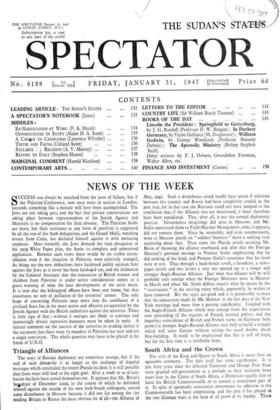Triangle of Alliances The ways of Russian diplomacy are sometimes
strange, but if the end of each demarche is as happy as the exchange of hopeful messages which concluded the recent Pravda incident it is still possible that those ways will lead to the right goal. After a week or so of con- fusion the facts have sorted themselves out. It appears that Mr. Bevin's brirdcast of December 22nd, in the course of which he defended himself against the attacks of his -own back-bench colleagues, caused some disturbance in Moscow because it did not list among the ties binding Britain to Russia the most obvious tie of all—the Alliance of May, 1942. Such a disturbance could hardly have arisen if relations between this country and Russia had been completely cordial in the past year, for in that case the Russians could not have jumped to the conclusion that, if the Alliance was not mentioned, it must therefore have been repudiated. That, after all, is not the normal diplomatic practice. Nevertheless misgivings did arise in Moscow, and Mr. Stalin mentioned them to Field-Marshal Montgomery, who, it appears, did not remove them. Since he ostensibly, and even ostentatiously, went to Moscow purely on " soldiers' business " there is nothing very surprising about that. Then came the Pravda article accusing Mr. Bevin of throwing the alliance overboard, and after that the Foreign Minister's personal message to Premier Stalin emphasising that he did nothing of the kind, and Premier Stalin's assurance that his fears were at rest. Thus through a back-bench revolt, a broadcast, a news- paper article and two letters a way was opened up to a longer and stronger Anglo-Russian Alliance. Just what that alliance will be will probably only emerge when the Foreign Ministers meet in Moscow in March and when Mr. Stalin defines exactly what he means by the " reservations " in the existing treaty which, apparently, he wishes to have .removed. But the signs are good and it is permissible to hope that the concessions made by Mr. Molotov in the last days of the New York meetings had more than a passing significance. Coupled with the Anglo-French Alliance which may emerge from the negotiations now proceeding (if the vagaries of French internal politics and the imperfect coincidence of British and French views on Germany both permit) a stronger Anglo-Russian Alliance may help to build a triangle which will unite Europe without raising the usual doubts about bloc-building. It needs to be emphasised that this is still all hope, but for the first time it is justifiable hope.


































